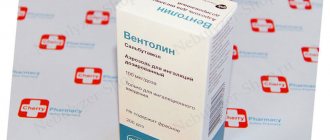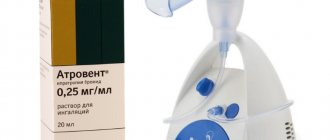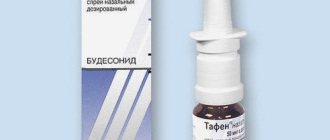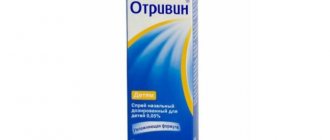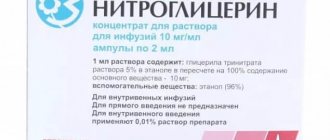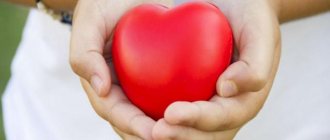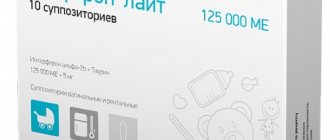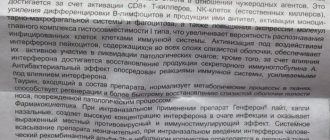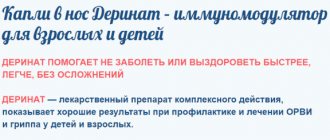Overdose
Increased side effects are a sign that an overdose has occurred during therapy.
Extremely high doses (more than 20 mg/kg) lead to methemoglobinemia, cyanosis, dyspnea and tachypnea, and orthostatic collapse. For mild symptoms, it is recommended to ensure sufficient supply of clean air into the room (open a window), lie down and elevate your legs. In more severe cases, the assistance of a doctor in an inpatient setting will be required. Treatment is aimed at eliminating intoxication and shock. Sometimes blood transfusions, hemodialysis, and oxygen therapy are indicated.
special instructions
Before taking the medicine, you should first read the following special recommendations:
It is prohibited to drink alcoholic beverages while using the drug; the spray should be used with caution in people who have suffered a heart attack or acute heart failure; cerebrovascular diseases are a relative contraindication; You can avoid a sharp decrease in blood pressure if you inject the solution while sitting or lying down; headache is a side effect that is often recorded at the beginning of treatment; the use of medication in older people increases the risk of adverse reactions (often fainting, dizziness); During therapy, it is necessary to refrain from driving vehicles and engaging in potentially hazardous activities that require increased concentration and speed of psychomotor reactions.
Frequent use of Nitrospray can lead to addiction, which results in a decrease in the effectiveness of the product. Sensitivity to the active substance is restored after a break in therapy. Store out of the reach of children and animals, away from fire and flammable objects at a temperature not exceeding 30°C. You can buy Nitrospray in pharmacies without presenting a prescription form. The shelf life is 3 years from the date indicated on the original packaging. It is prohibited to use medicine that has expired.
Composition and action
Analogues of a medicinal product such as Nitrospray may have a slightly different composition, for example, in tablets, in addition to nitroglycerin, lactose, potato starch, and magnesium stearate are used. This is necessary in order to give the medicine a more pleasant taste.
Nitrospray for the heart expands the walls of blood vessels, reduces the load on the heart and venous return. The drug redistributes the blood and enriches it with oxygen, thereby improving myocardial blood flow and preventing shortness of breath.
In addition to its effect on the heart, the medication relaxes the muscles of the gallbladder, bile ducts, and urinary tract. After application, the result of relief for the patient occurs within 2 minutes, and the effect lasts for about 30 minutes.
The medication causes dilation of the coronary vessels, while the flow of blood becomes faster and the lack of oxygen stops. You can use the medication not only if you have problems with the heart muscle, but also with pulmonary edema.
Nitroglycerin suppresses the vascular component, which affects the appearance of pain in the heart area. In most cases, after the first use of the spray, there is a significant improvement.
The spray is administered under the tongue, since in this area the active substance is completely absorbed into the systemic bloodstream. Thanks to this use, the components do not affect the liver in any way, acting only on the main organ - the cardiac system. The drug is eliminated from the blood quickly - in about 4-5 minutes.
The drug has a large number of analogues, which are identical both in composition and in indications for use. Nitroglycerin, which is part of the drug Nitrospray, is also present in them.
| The cheapest | Popular analogues | Analogues in composition and indications |
| Cardiket | Nitroglycerine | Nitroglycerine |
| Carthiket Retard | Cardiket | Nitrocore |
| Nitrocord | Isoket | Nitrogranulong |
| Nitrosorbitol | Iso-Mik | Nitro-Mick |
| Nitroglycerine | Monocinque Retard | Nitromax |
| Nitrosprint |
All these drugs have in common the composition and indications for use. Only the doctor decides which medication the patient should take.
Nitroglycerine. Indications for use
Oral forms
The drug is used orally to relieve acute angina attacks, as well as to prevent relapses of attacks (retarded forms). Nitroglycerin can also be used to reduce the area of ischemia during a heart attack (as part of complex treatment) and left ventricular failure.
Use for non-cardiac pathologies
Sometimes nitroglycerin is used as part of complex therapy for biliary dyskinesia (biliary dyskinesia) for the purpose of antispasmodic effects on the biliary tract.
In ophthalmology, nitroglycerin is used for embolism of the central retinal artery (CRA).
Intravenous use
The solution is used intravenously for:
- heart attack;
- post-infarction unstable angina;
- severe left ventricular failure;
- pulmonary edema;
- hypertensive crisis due to HF (heart failure);
- the need to create controlled hypotension during surgery;
- refractory (stable) angina pectoris;
- CAS embolism.
Temporary cessation of therapy
Nitroglycerin instructions for use contain information that in order to prevent the development of nitrate tolerance (addiction to the drug and a decrease in the therapeutic effect), it is necessary to observe the so-called “nitrate-free intervals” (night intervals between taking tablets for eight to twelve hours).
Maintaining intervals between taking Nitroglycerin helps increase the effectiveness of treatment.
Most often, addiction develops when long-acting (retard) forms of nitroglycerin are prescribed. If nitrate tolerance develops, it is necessary to pause treatment. After discontinuation of nitrate therapy for a certain period of time, sensitivity is completely restored.
Features of use and interaction with other medications
When prescribing Nitroglycerin, first of all, the patient should read its instructions and pay attention to contraindications and cases of side effects. Taking the drug requires special attention: Taking the drug requires special attention:
Taking the drug requires special attention:
- The spray should not be used to treat children, as the active substance can negatively affect the child’s body.
- During pregnancy, the medication is contraindicated, but a cardiologist can prescribe it to a pregnant woman in case of urgent need.
If you are hypersensitive to the drug and its constituent substances, it is better to refuse treatment and use another drug. In the presence of hypotension, the use of Nitroglycerin can be dangerous to human health and life, therefore, in this case, consultation with a doctor is required.
It should be used with caution in patients with anemia, atherosclerosis and circulatory disorders in the brain. In addition, Nitroglycerin can be addictive, so it should be taken according to a certain schedule to avoid this. In addition, Nitroglycerin can be addictive, to avoid this it should be taken according to a certain scheme
In addition, Nitroglycerin can be addictive, so it should be taken according to a certain schedule to avoid this.
During treatment with this drug, it is necessary to stop operating various mechanisms, since while taking Nitroglycerin, inhibition and other negative consequences may develop that interfere with the control of a particular vehicle.
Do not use the drug with medications such as:
- calcium channel blockers;
- vasodilators;
- antidepressants.
During treatment, it is better to avoid alcohol, which can enhance the effect of the drug, which can negatively affect the body. An increased content of the active substance in the blood can be caused by simultaneous use of the medication with Aspirin and its derivatives.
Nitroglycerin has the following benefits:
- Helps stop heart attacks in a short time.
- It has a convenient spray form.
- Has a low cost.
- It is highly effective.
The drug has certain indications and contraindications, as well as side effects. In case of drug overdose, emergency measures must be taken as soon as possible. In some cases, hospitalization may be required.
When choosing Nitroglycerin for the treatment of heart or gastrointestinal diseases, you should be extremely careful with the use of the substance. To avoid or minimize the risk of developing dangerous conditions, you should follow the recommendations of a specialist and not exceed the prescribed dose.
What are the contraindications for nitrospray?
Contraindications
Nitrospray is not recommended for use when:
- High sensitivity of the body to nitrates of organic origin;
- Angle-closure form of glaucoma;
- Acute arterial hypotension;
- Increased cerebral pressure, which can be caused by bleeding into the brain or injury;
- Concomitant use of phosphodiesterase drugs (inhibitors);
- Childhood (under 18 years old);
- Pregnancy.
Nitroglycerin should be taken with extreme caution and in small doses for:
- Acute cardiac rupture with reduced pressure in the left ventricular region, as the risk of an even greater decrease in pressure, tachycardia, and the development of extensive ischemia increases;
- Chronic heart failure;
- Severe anemia;
- Thyrotoxicosis;
- Cardiomyopathy due to cardiac hypertrophy;
- Severe kidney and liver failure.
Attention! The use of nitroglycerin during lactation is possible, but studies confirming the passage of nitroglycerin into breast milk have not been conducted. Therefore, taking the drug should be strictly controlled by a doctor.
Nitroglycerin description of the drug, principle of action
“Nitroglycerin” belongs to the category of antianginal drugs, nitrates, that is, it promotes the release of nitric oxide in the blood vessels, which relieves tension from smooth muscles. Due to this, the myocardial oxygen demand decreases, reducing the load on the heart.
“Nitroglycerin” normalizes blood flow in the areas of the main human muscle affected by ischemia, stabilizes the jumping pressure. Thanks to it, patients with coronary artery disease and angina can tolerate physical activity more easily.
"Nitroglycerin" is known for several possibilities:
- restore the flow of oxygen to the myocardium;
- reduce the need for large amounts of this compound;
- dilate coronary vessels, relieving spasm;
- relieve heart pain.
This necessitates its use in the following pathologies:
- angina pectoris;
- myocardial infarction;
- heart failure.
“Nitroglycerin” is indicated not only in a difficult period or during an attack, but also to prevent the listed diseases. The drug comes in tablets, injection solution, and in the form of a patch. Which form is needed in a particular case is determined by the severity of the patient’s condition.
The attack is quickly stopped with a tablet placed under the tongue. When a patient in acute condition is admitted to the hospital, he receives Nitroglycerin intravenously. The big advantage of the medicine is its almost instant effect.
Nitroglycerin tablets are available to almost everyone due to their low cost. It ranges from 25 to 80 rubles.
Instructions for use of Nitroglycerin method and dosage
If the patient does not adhere to the recommended doses, this can lead to an overdose, which has the following symptoms:
- headache and dizziness;
- numbness of the limbs;
- blueness of the skin of the hands and lips;
- a feeling of compression in the temples;
- weakness;
- dyspnea;
- abnormal heart rhythm;
- elevated temperature;
- limb spasms.
For first aid in case of overdose, the patient needs to lie down and raise his legs slightly. This is necessary in order to enhance venous return. Nitroglycerin is eliminated from the body very quickly, and relief should come very quickly.
If such manipulations do not produce any results, you need to call an ambulance, which will give an injection of sympathomimetics - phenylephrine or methoxamine.
Nitrospray (nitroglycerin) cannot be combined with other vasodilators, antipsychotics and antihypertensive drugs. Such a combination will lead to the fact that both medications will not bring any therapeutic results.
Important! You should not drink alcohol during treatment with Nitrospray. Such a combination can be fatal! To prevent complications, Nitroglycerin is recommended to be taken as prescribed by a doctor.
To prevent complications, Nitroglycerin is recommended to be taken as prescribed by a doctor.
Nitroglycerin tablets are taken (sublingually) under the tongue, held in the mouth until completely dissolved, without swallowing.
Nitroglycerin should be taken immediately when the first signs of an angina attack appear or before expected physical activity or emotional stress. Single dose – 1 tablet. In case of stable angina pectoris, the effect may occur with a smaller dose; in this case, it is recommended to spit out the remaining tablet that has not had time to dissolve.
If there is no therapeutic effect after taking 2 Nitroglycerin tablets, you should immediately consult a doctor.
Spray sublingual
Injected on or under the tongue, preferably in a sitting position, while holding your breath. After spraying, the spray is not swallowed immediately, but is held by closing the mouth for a few seconds.
To avoid complications, Nitroglycerin should be used as prescribed by a doctor.
If after using 3 doses over 15 minutes the condition does not improve, you should consult your doctor.
The maximum single dose is 3 doses of spray.
If the indication for the use of Nitroglycerin is the prevention of angina attacks, the drug is used 1 dose 5-10 minutes before the expected load or stress.
The spray package should not be shaken before use. When spraying, the bottle must be held vertically.
Infusion solution
Administration of Nitroglycerin using a conventional fluid transfusion system ensures dosage accuracy by counting the number of drops of fluid being transfused. Before administration, the Nitroglycerin solution is first diluted in a 0.9% sodium chloride solution or a 5% glucose (dextrose) solution to a concentration of 0.01%. No other solvents should be used.
It is advisable to use glass and polyethylene tubes, since the active substance is absorbed on the walls of polyvinyl chloride tubes (losses can be 40-80%). Nitroglycerin solution is quickly destroyed in light, so the transfusion system and bottles must be shielded with light-proof material. Storing the solution in an opened ampoule is not allowed.
The initial rate of administration of the solution is 0.5-1 mg per hour, the maximum rate is 8-10 mg per hour.
Recommended concentrations and rates of administration of Nitroglycerin are: 1 mg/h (0.0166 mg/min) - 24 mg per day via an automatic dispenser (solution volume 1 mg/ml) or 240 mg per day via an intravenous system (solution volume 0 .1 mg/ml); injection rate – 3-4 drops per minute (1 ml corresponds to 20 drops).
The duration of therapy is determined by clinical indications and can vary from several hours to 2-3 days.
If signs of overdose occur, you should immediately put the patient in a horizontal position, raising his legs, and also seek medical help.
How to use nitrospray?
If an attack of angina occurs for the first time, then you should use no more than one dose of nitroglycerin spray under the tongue. If necessary, the reception can be repeated after 5-10 minutes. If the pressure becomes even higher even after the third dose, it is recommended to urgently call a doctor.
For prevention, one dose is used ten minutes before the predicted stress of an emotional or physical nature. The largest dose at one time is 4 presses, and 16 per day.
To take nitroglycerin aerosol, you need to sit on a chair, remove the cap from the nitrospray bottle, and keep the bottle in an upright position. With your mouth open, press the sprayer, directing it under your tongue.
Nitroglycerin aerosol
Consultation with a specialist is required!
The information is posted on the site for informational purposes only. Consultation with a specialist is required.
in the text, incorrect review or incorrect information in the description, then we ask you to report this to the site administrator.
Reviews posted on this site are the personal opinions of the people who wrote them. Don't self-medicate!
"Nitroglycerin-aerosol" - a new original drug
In recent years, the acceleration of the pace of life and stress have caused an increase in diseases of the cardiovascular system, including coronary heart disease (CHD).
IHD is an atherosclerotic lesion of the coronary artery system, leading to coronary insufficiency and the development of angina pectoris (angina), sudden death, degeneration, necrosis and sclerosis of the myocardium.
The occurrence of an attack of angina is directly dependent on the workload of the heart, which increases with physical and emotional stress and is often combined with arterial hypertension (AH) and circulatory failure (CI).
Currently, in many countries (Italy, England, Germany, Hungary) there are aerosol preparations of nitroglycerin: “Nitro-dur”, “Glytrin-spray”, “Nitrolingual-spray”, “Nitromint”.
Nitroglycerin in the form of sublingual tablets often in a critical situation may not give the expected effect.
Side effects and drug interactions
Nitrospray, like any other medicine, has side effects. Reviews from cardiologists and the instructions for use of Nitrospray indicate that the drug can cause the following symptoms:
- decreased blood pressure;
- dizziness and headache;
- tachycardia;
- feeling of heat;
- dry mouth;
- weakness;
- burning sensation under the tongue.
In rare cases, patients complain of nausea, vomiting, abdominal pain, lethargy, anxiety, skin rash and itching, and blurred vision.
It is important for patients to remember that this drug, when combined with certain other drugs, can cause unwanted effects. For example, the hypotensive effect of nitroglycerin may be enhanced
The instructions for use of Nitrospray indicate that this is possible when combining the medication:
- with vasodilators (drugs from the group of vasodilators);
- antihypertensive medications (lowering blood pressure);
- angiotensin-converting enzyme inhibitors (medicines that are included in modern standards of treatment for arterial hypertension and chronic heart failure);
- neuroleptics, tricyclic antidepressants (psychotropic drugs used in the treatment of psychoses, severe mental disorders, depressive states);
- phosphodiesterase type 5 inhibitors (widely used by specialists in the treatment of erectile dysfunction).
Adverse reactions
The use of Nitrospray may result in the following undesirable consequences:
- dizziness;
- migraine-type headache;
- blurred vision;
- general weakness;
- causeless anxiety, restlessness;
- cardiopalmus;
- dry mouth;
- nausea;
- vomit.
Attention! Itching, skin rash, dermatitis are signs of allergies that are recorded extremely rarely.
The severity of side effects depends on the individual characteristics of the patient’s body. Most often, unwanted reactions from the body appear in people with chronic diseases and over 60 years of age.
Overdose
An overdose is possible if you ignore the recommendations from the instructions included with Nitrospray. Nitroglycerin can cause a decrease in blood pressure, headache, reflex tachycardia, facial flushing, dizziness, vomiting, diarrhea, a feeling of heat, and drowsiness. When using not too many doses, the patient should be placed on a sofa or bed so that his legs are in an elevated position.
In severe cases, when taking a large number of doses, symptoms such as cyanosis, a feeling of lack of air, rapid shallow breathing, orthostatic collapse, and methemoglobinemia (the appearance of an increased amount of methemoglobin in the blood) are recorded. With such manifestations of overdose, doctors use methods to treat intoxication and shock (the volume of circulating blood must be replenished, the use of norepinephrine and/or dopamine, etc. is necessary).
Nitroglycerin overdose
If the dose of nitroglycerin is exaggerated, patients experience the following symptoms:
- Hypotension;
- Dizziness;
- High sleepiness;
- Feeling hot;
- Vomiting and loose stools;
- Darkening in the eyes;
- Pale skin;
- Asthenia.
If the doses of nitroglycerin are extremely high, the consequences will be even more detrimental: dyspnea, cyanosis, coma.
In this case, you need to lay the patient down, raising his legs above the level of his head, take general measures to combat intoxication of the body, and perform rinsing.
List of analogues
Note! The list contains synonyms for Nitrospray, which have a similar composition, so you can choose a replacement yourself, taking into account the form and dose of the medicine prescribed by your doctor. Give preference to manufacturers from the USA, Japan, Western Europe, as well as well-known companies from Eastern Europe: KRKA, Gedeon Richter, Actavis, Egis, Lek, Hexal, Teva, Zentiva
| Release form () | price, rub. |
| Nitrospray | |
| Spray sublingual dosage. 1% 10ml (Pharmstandard – Leksredstva OJSC (Russia) | 101 |
| Gluconite | |
| Deposit 10 | |
| Nirmin | |
| Nit-ret | |
| Nitradisk | |
| Nitro | |
| Nitro Mac Ampoules | |
| Nitro Mac retard | |
| Nitro POL infusion | |
| Nitro-dur | |
| Nitro-Nick tablets | |
| Nitroglycerine | |
| Caps 5mkg N40 Lumi (Lumi LLC (Russia) | 18.40 |
| Tab 0.0005 N40 Ozone (Ozone LLC (Russia) | 51.80 |
| Tab 0.0005 N40 Medisorb (Medisorb JSC (Russia) | 54.10 |
| 0.4 mg / dose 200 doses 10 ml / 8 g sublingual spray (Medisorb JSC (Russia) | 124.20 |
| Nitroglycerin | |
| Nitroglycerin microgranules | |
| Nitroglycerin Nycomed | |
| Nitroglycerin with glucose | |
| Nitroglycerin with lactose | |
| Nitroglycerin forte | |
| Nitroglycerin concentrate for infusion 1% | |
| Nitroglycerin solution 1% | |
| Nitroglycerin solution in oil 1% in capsules | |
| Nitroglycerin injection solution 0.1% | |
| Nitroglycerin tablets 0.0005 g | |
| Nitrogranulong | |
| Nitrogranulonga film-coated tablets | |
| Nitroject | |
| Nitrocardine | |
| Nitrocore | |
| Tab 0.5 mg N40 (Pharmstandard – Leksredstva OJSC (Russia) | 52.20 |
| Nitrolingual-Aerosol | |
| Nitrolong | |
| Nitromint | |
| Aerosol 10g (Egis Pharmaceutical Plant JSC (Hungary) | 172.20 |
| Nitrong | |
| Nitrong forte | |
| Nitropercutene TTS | |
| Nitrospray-ICN | |
| Spray 1%, 10 ml (Pharmstandard, Russia) | 98 |
| Sublingual dosed spray 0.4 mg / dose 10 ml (Pharmstandard, Russia) | 115 |
| Nitrosprint | |
| 0.4 mg / dose 15 ml 300 doses sublingual spray (Microkhim NPF LLC (Russia) | 130.60 |
| Perlinganite | |
| 0.1% – 10ml No. 1 amp (Schwarz Pharma Productions GmbH (Germany) | 871.10 |
| Sustak mite | |
| Sustak forte | |
| Sustonite | |
| Trinitrolong | |
| Film 2 mg N10 (Yaroslavl pharmaceutical factory CJSC (Russia) | 109.20 |
Analogs and price
Popular analogues of Nitrospray are:
- Nitro – concentrate for the preparation of solution for infusion. It is an antianginal drug belonging to the group of peripheral vasodilators with a predominant effect on venous vessels.
- Nitromint is a vasodilator drug used in the treatment of angina pectoris. Nitroglycerin is presented in a concentration of 0.4 mg (as a 1% solution).
- Nitroglesirin is a vasodilator drug used to relieve attacks of angina. Nitroglycerin sublingual tablets contain the active component nitroglycerin and additional components.
- Nitromax is a vasodilator, organic nitrate, which is used in the treatment of cardiac diseases. Refers to antianginal, vasodilator, coronary dilation agents
- Nitrolong is a vasodilator and angioprotective agent. Designed to relieve an attack of angina pectoris.
- Sustak forte is a drug with vasodilating, antianginal, hypotensive and vasodilating effects. Available in tablet form, as a solution, ointment, dosed aerosol, capsules, films, spray.
- Trinitrolong is a vasodilator and antianginal drug. The drug is produced in the form of polymer films for gluing to the gums.
Nitroglycerin is the active ingredient in these drugs. Despite this, each drug has its own list of indications, contraindications, and side effects. A specialist should select an analogue.
You can buy Nitrospray, 10 ml (200 doses) for 120 rubles. The cost depends on the region of the Russian Federation and the pricing policy of the pharmacy where the medicine is sold.
special instructions
The therapeutic doses indicated in the instructions should not be exceeded.
During therapy, a significant decrease in blood pressure and the development of dizziness are possible with a sudden transition to a vertical position from a lying or sitting position, as well as in hot weather, when doing physical exercise or drinking alcohol.
If blurred vision or dryness of the oral mucosa persists or becomes significant, treatment should be interrupted.
According to the instructions, Nitroglycerin, like other organic nitrates, can be addictive (in this case, an increase in dosage will be required).
The severity of headache during therapy can be reduced by reducing the dose of the drug and/or simultaneous administration of validol.
For frequent attacks of angina, it is recommended to use long-acting nitroglycerin medications.
While using Nitroglycerin, drinking alcoholic beverages is strictly prohibited.
The sublingual spray contains alcohol, which is important for nursing and pregnant women, patients with functional liver disorders, epilepsy, traumatic brain injuries and other diseases of the central nervous system, as well as alcohol abuse. In acute heart failure or acute myocardial infarction, Nitroglycerin should be used only under the condition of careful clinical monitoring of the patient's condition
In acute heart failure or acute myocardial infarction, Nitroglycerin should be used only under the condition of careful clinical monitoring of the patient's condition.
To prevent an increase in angina attacks, it is recommended to avoid abrupt withdrawal of the drug.
To prevent an unwanted decrease in blood pressure, the rate of administration of the Nitroglycerin infusion solution must be selected individually. A decrease in blood pressure can be observed not only when selecting the rate of solution administration, but also later, against the background of initially stabilized blood pressure (monitoring should be carried out at least 3-4 times per hour throughout the entire infusion time).
Patients previously treated with organic nitrates (isosorbide-5-mononitrate, isosorbide dinitrate) may require a higher dose to obtain the desired hemodynamic effect.
When using Nitroglycerin, care must be taken when driving vehicles and performing potentially dangerous types of work that require increased concentration and rapid psychomotor reactions.
Contraindications
- collapse;
- shock;
- age under 18 years (lack of sufficient clinical data);
- simultaneous use of phosphodiesterase type five inhibitors PDE-5 (including sildenafil, vardenafil, tadalafil and other PDE-5 inhibitors);
- severe arterial hypotension (systolic blood pressure below 90 mmHg);
- cardiogenic shock (if measures are not taken to maintain end-diastolic pressure);
- angina caused by hypertrophic obstructive cardiomyopathy;
- constrictive pericarditis;
- pericardial tamponade;
- acute myocardial infarction and chronic heart failure with low left ventricular filling pressure;
- severe stenosis of the aortic and/or mitral valve, primary pulmonary hypertension (since hyperemia of insufficiently ventilated alveolar zones can lead to hypoxia);
- any condition associated with increased intracranial pressure;
- increased sensitivity to nitrates.
Mechanism of action
The action of the peripheral vasodilator Nitrospray is aimed at venous vessels, or rather at their expansion. The therapeutic effect of the drug is based on the active substance. The effectiveness is due to the ability of nitroglycerin to release nitric oxide from its own molecule. This inorganic binary compound of nitrogen and oxygen undergoes a series of complex chemical reactions in the body. The smooth muscles of the vascular wall relax and the blood vessels dilate. As a result, venous return to the heart (preload) and resistance to the systemic circulation (afterload) decrease. Nitrospray has the following main properties:
- the load on the heart decreases;
- the need of the heart muscle (myocardium) for oxygen decreases;
- coronary blood flow improves due to vasodilation;
- oxygen delivery to damaged areas of the myocardium increases.
Attention!
Nitroglycerin also relaxes the smooth muscle cells of the bronchi, urinary tract, gallbladder, bile ducts, esophagus, small and large intestines, as well as their sphincters.
After injecting the medicine under the tongue, the effect occurs almost immediately, after approximately 1-1.5 minutes and lasts half an hour. The active substance is quickly and completely absorbed into the systemic circulation. Bioavailability is 100%, since with sublingual administration there is no primary passage of the drug through the liver. The maximum concentration of the drug in blood plasma cells is observed after 4 minutes. Most of it is excreted from the body by the kidneys in a modified form (metabolites); the unchanged form accounts for less than 1%.
Pharmacokinetics
Nitrospray, when administered sublingually, is quickly and completely absorbed from the oral cavity into the blood system. The bioavailability of nitroglycerin with this intake is 99 percent, since the primary transformation of the active substance in the liver is absolutely excluded. The highest concentration of nitroglycerin in the blood plasma is observed 4 minutes after receiving the dose.
The binding of nitroglycerin from the spray to blood proteins is 60 percent. This compound is metabolized quite quickly by the action of nitrate reductase. In this case, simple nitrates are formed - mononitrates and glycerol. These substances leave the body along with urine.
After taking a dose of nitrospray under the tongue, its half-life from the blood plasma will be 3-5 minutes. Nitroglycerin circulating in the blood has a close relationship with red blood cells and accumulates in the vascular walls. It is then excreted in the renal system. Less than 1 percent of the substance leaves the body unchanged.
